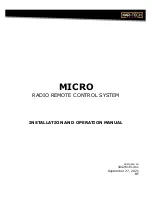
11
11
english
BIS C-60_3 Processor
Basic knowledge for application
The processor writes data from the host system to the data carrier or reads data from the tag
through the read/write head and prepares it for the host system. Host systems may include:
–
a host computer (e.g. industrial PC) or
–
a programmable logic controller (PLC)
When sending data between the read/write head and the data carrier a procedure is required
for recognizing whether the data were correctly read or written.
The processor is supplied with standard Balluff procedure of double reading and comparing.
In addition to this procedure a second alternative is available: CRC-16 data checking.
Here a test code is written to the data carrier, allowing data to be checked for validity at any
time or location.
Advantages of CRC_16
Advantages of double reading
Data checking even during the non-active phase
(CT outside read/write head zone).
No bytes on the data carrier need to be
reserved for storing a check code.
Shorter read times since each page is read only
once.
Shorter write times since no CRC needs to be
written.
Since both variations have their advantages depending on the application, the user is free to
select which method of data checking he wishes to use (see Parametering on 22).
It is not permitted to operate the system using both check procedures!
Control Function
Data checking
☞
C60_3-025_825645_1310_e.p65
12
english
12
Communication between the BIS C-60_3 processor and the host system is via DeviceNet.
The DeviceNet system consists of the components:
– the Master (DeviceNet Master) as a controller component, and
– the bus nodes (here the BIS C-60_3 Processor)
A maximum of 63 nodes can be connected to a Master.
The Master converts the data: from the controlling system into the serial protocol of the
DeviceNet network and the reverse. For this it possesses the DeviceNet port for connecting
with the decentralized DeviceNet nodes. Information for configuring the Master can be found
in the corresponding manual.
The connection between the NMaster and the BIs C-60_3 Processor is made using the
predefined master/slave connection set
. The DeviceNet functionality of the BIS C-60_3
corresponds to a
group 2 only server
.
DeviceNet describes the parameters and functions of a device using an object model. Access
by the network to the individual objects is accomplished exclusively using conection objects.
The object model of the BIS C-60_3 Processor is shown in 13.
DeviceNet
BUS interface DeviceNet
Opening the
connection
Object model
















































